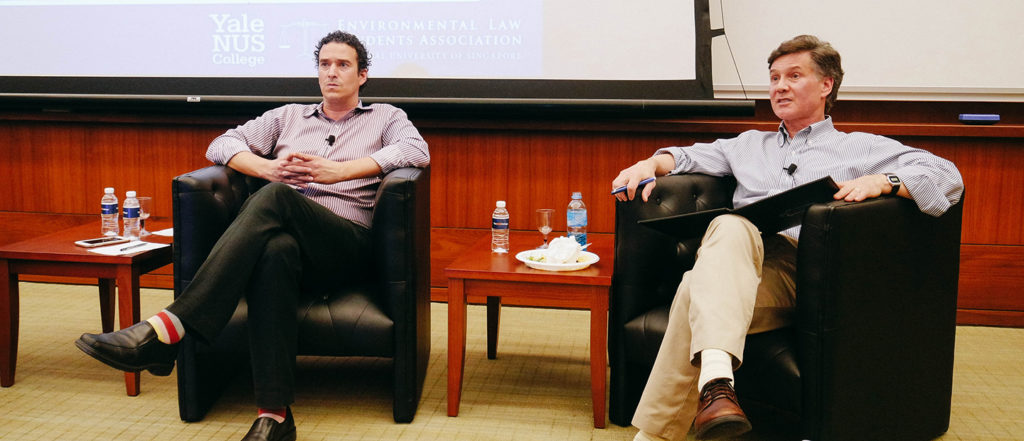New rules of international environmental law: Yale-NUS organises dialogue with two distinguished Yale professors
 Professor Douglas Kysar (left) and Professor Daniel C. Esty (right)
Professor Douglas Kysar (left) and Professor Daniel C. Esty (right)
On 1 February 2018, Yale-NUS College hosted a talk titled “New Rules of International Environmental Law” featuring two distinguished environmental law experts from Yale Law School, Professor Daniel C. Esty and Professor Douglas Kysar.
Professor Esty is the Hillhouse Professor of Environmental Law and Policy at Yale and holds faculty appointments in both Yale’s Environment and Law Schools with a secondary appointment at the Yale School of Management. He is currently a visiting professor at Yale-NUS College, where he is teaching a course titled Special Topics in Environmental Studies: Climate Change and the Future of Energy. The course offers an interdisciplinary examination of climate change and policy challenges around developing energy systems for a sustainable future.
Professor Kysar is the Joseph M. Field ’55 Professor of Law at Yale Law School. He is also a visiting professor at the Faculty of Law at the National University of Singapore (NUS), where he is teaching a three-week intensive seminar titled Climate Change Law & Policy. Notably, Professor Kysar published a monograph, Regulating from Nowhere: Environmental Law and the Search for Objectivity (YUP 2010), which seeks to reinvigorate environmental law and policy by offering novel theoretical insights on cost-benefit analysis, the precautionary principle, and sustainable development.
The event was organised by the Yale-NUS Double Degree Programme in Law and Liberal Arts (DDP) in collaboration with the Environmental Law Student Association (ELSA) at the NUS Faculty of Law.
According to the Head of Studies of the DDP, Dr Navin Rajagobal, the event was the result of several “happy coincidences”.
“I knew from my counterparts at Yale University that the two professors will be visiting Yale-NUS and NUS Law respectively. As both of them would be here only for a short period, an idea germinated that they should do an event together,” he shared.
A DDP student, Jamie Lee (Class of 2019), was taking classes by both professors and volunteered to moderate the discussion. Jamie is also Vice-President (Public Relations) of ELSA.
“Both professors have varying stances on how international environmental governance should be implemented, so I thought it would be meaningful for both of them to engage on current issues in the global climate regime. I volunteered to moderate the discussion since I am taking both their classes,” she shared.
In addition to her interest in environmental law, Jamie is also planning to major in Environmental Studies at Yale-NUS and she shared that the DDP has “grown my passion for environmental law and policy immensely.”
“Through the DDP, I recognise the need for a deep understanding of environmental issues from an interdisciplinary standpoint. Law and policy work in tandem to create lasting change, and so my legal reasoning and liberal arts background will serve me well as I pursue a career in environmental policymaking,” Jamie shared.
Peter Lewis (Class of 2018) decided to attend the event because he was “curious to learn about the role of law, business, and culture in addressing environmental degradation”.
“As an Environmental Studies major, I am keenly interested in the role that individuals and institutions play in shaping our planet, especially within the food system. One of my main takeaways was that imagination can give us a vision of the future we want to create, and business can help us find the pathway to achieve it,” he shared.
“During the discussion, Professor Kysar asked us to imagine a culture that embodies this ethic of nonviolence, and the idea of a vegan food system immediately came to my mind. Although such an idea may seem like a pipe dream, Professor Esty emphasised the central role of business in creating innovative solutions in the 21st century, which is something that the food industry is already embracing with plant-based innovators like Impossible Foods, and corporations like Temasek Holdings and Goldman Sachs investing in plant-based technologies.”
Another student who attended the event was Christal Lim (Class of 2021), who is also in the DDP. Christal was interested to hear from the two experts as she was “curious to see how the law could shape steps towards environmental sustainability beyond that of policy formation.”
The talk appealed to Christal also because it provided an example of the intersection between law and the liberal arts.
“Law does not often play out as a solution in isolation, given the various ways by which it intersects with different aspects of society. It is only through a well-rounded education of both the liberal arts and the law, and the development of a broader worldview that we can approach societal issues more effectively,” she shared.
Professor Kysar’s warning that the damage done to the environment was “in no way reversible, with measures only seeking to postpone its detrimental effects” struck a chord in Christal. She added that it helped her better appreciate the urgent need for greater mitigation measures among the international community because of the irrevocable nature of human actions and its subsequent effects on the environment.
Jamie observed that the event was a success, with a sizeable turnout comprising not only students but also policy strategists and civil society advocates.
“It was great to have both Yale Law School professors at Yale-NUS with a DDP student as moderator. The DDP will continue to host experts from Yale and other institutions to talk about important and current issues,” Dr Rajagobal said.
The Double Degree Programme in Law and Liberal Arts is offered jointly by Yale-NUS College and Faculty of Law, National University of Singapore (NUS) for students seeking a broad liberal arts education in addition to their professional training in the law. Students take classes at both institutions and graduate with a Bachelor of Arts (with Honours) degree from Yale-NUS College and a Bachelor of Laws (with Honours) degree from the Faculty of Law, NUS.





